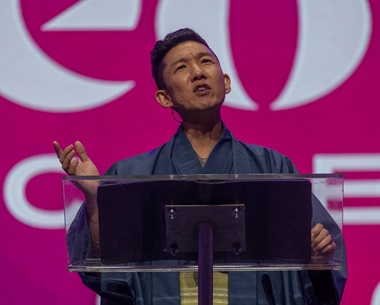
Michael Oh, leader of the Lausanne Movement, welcomed more than 5,000 participants to Incheon/Seoul for Lausanne 4.
We humbly repent of our flaws and failures. We repent of our pride and parochialism. We repent of our isolation and our arrogance. And so, we gather.
So said Michael Oh, Global Executive Director / CEO of the Lausanne Movement during the opening evening of the Fourth Lausanne Congress in Incheon, South Korea.
And what a grand gathering. More than 5,200 Christians from almost every nation have assembled at Incheon (adjacent to Seoul). We are now coming toward the end of the week. About 180 are from Canada, including a good number from Vancouver.
Leading up to the gathering, Oh – who is of Korean descent – described its purpose:
Lausanne 4 is a multi-year, global, polycentric process facilitated by the platform of Lausanne, towards catalytic collaboration of the global church, for the discipling of all nations and the shaping of the world in 2050.
The first three congresses took place in Lausanne (1974), Manila (1989) and Cape Town (2010). I wrote about the Lausanne Movement and my involvement last week.
Lausanne 4 has been a tremendous experience, full of encouragement, fascinating individual meetings, good teaching and strong worship (often led by Keith & Kristyn Getty, known particularly for ‘In Christ Alone’). But it has also been very full, so I will just offer a brief introduction, with more to come next week.
Worldwide movement
Probably the single greatest joy of attending Lausanne is meeting really interesting people from all over the world.
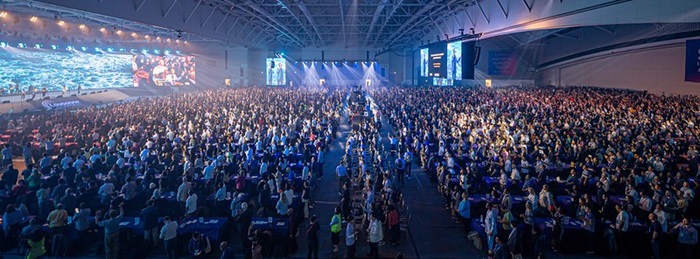
More than 5,000 people are participating in Lausanne 4.
Just a few examples:
- English barrister, judge and international arbitrator;
- young woman sheet metal worker from northern Europe, hoping to go into missions;
- two men working on land and property issues in Kenya;
- Lily, who works with Muslims, Hindus and Buddhists in the global south;
- two young women, one working with vulnerable women in Bolivia, the other in a Bangkok slum;
- Ghanaian woman working with Scripture Union;
- two Indian church planters overseeing more than 100 churches;
- Malaysian man working with Mission to Seafarers.
Mentioned more than once has been the fact that the bulk of mission work is done by faithful, unknown people. But there are some big (and fairly big) names here. The first I didn’t meet, but I had good brief chats with the other three:
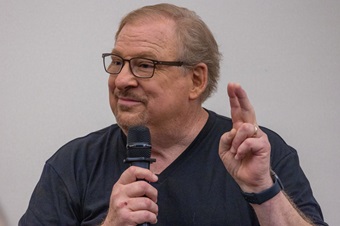
Rick Warren took part in Lausanne 4.
- Rick Warren: California megachurch pastor, author and global influencer;
- Todd Johnstone: Professor of Mission and Global Christianity and author of many books including World Christian Encyclopedia;
- Viv Grigg: a prophetic voice, missions entrepreneur, networker and servant among the urban poor. Books include Cry of the Urban Poor and Slum Dwellers’ Theology;
- Peter Schuurman: author of the brand new Blessed are the Undone.
We meet daily at assigned tables. Most have six people, but two of our participants were not able to join us. The four at table F84 – described tonight by our table leader as “our little church” – are from India (working in the horn of Africa), Germany, the Philippines and Canada.
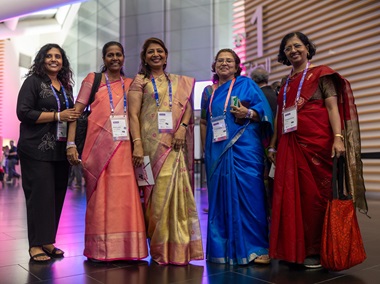
Participants were asked to wear their national dress on Wednesday.
The goal of the Lausanne Movement is to better represent the world church in these gatherings – but it has only been partially successful.
As Morgan Lee reported for Christianity Today September 24:
Though the Lausanne 4 organizers had originally sought to have North Americans make up around 5 percent of the overall in-person delegate population, delegates living in that region ultimately represented 25.5 percent of total participants. (Lausanne’s statistics are based on the delegate’s place of residence.) Together with Europeans (13%), Westerners make up 38.5% of total delegates.
About one-third (36.9%) of delegates reside in Asian countries, compared to 12.8 percent in Africa and 7.7 percent in Latin America. Representatives living in Oceania make up 3 percent and those in the Caribbean make up 1.1 percent.
She added:
The Seoul Congress features an all-time high percentage of female delegates (29%) and of delegates under 40 (16%). More than 1,450 attendees work outside of full-time ministry.
Vancouver participants
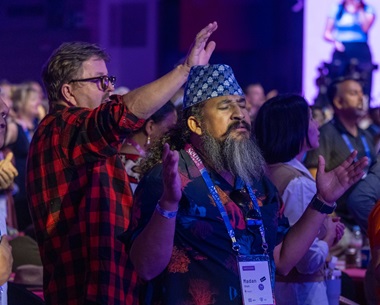
Mike Davies, left, participating in worship.
I have yet to discover the exact number from Metro Vancouver, but so far I know of these:
- Shaila Visser, National Director of Alpha Canada and the Global Senior Vice-President for Alpha International;
- Jeffrey Greenman, President & Professor of Theology & Ethics, Regent College;
- Mike Davies, YWAM leader, locally and internationally;
- Samuel Chiu: Community Engagement Coordinator, A Rocha Canada;
- Stephen Mulder, Senior Director for Partner Engagement, Missional Labs;
- Murray Moerman: pastor, author, Saturation Church Planting Catalyst;
- Izumi Araki, Vice President, International Field, International Student Ministries Canada
- Enoch Weng: Rise Above Finance
At least three others took part in a gathering of Canadian participants this morning, and there are no doubt more about. I still hope to meet them.
Key themes
Among the key themes have been:
- Collaboration: Michael Oh: “The four most dangerous words in the global church today are, ‘I don’t need you.'”
- Persecution: Patrick Fung, for almost two decades General Director of OMF International: “Persecution will never kill the church, but a compromised gospel will.”
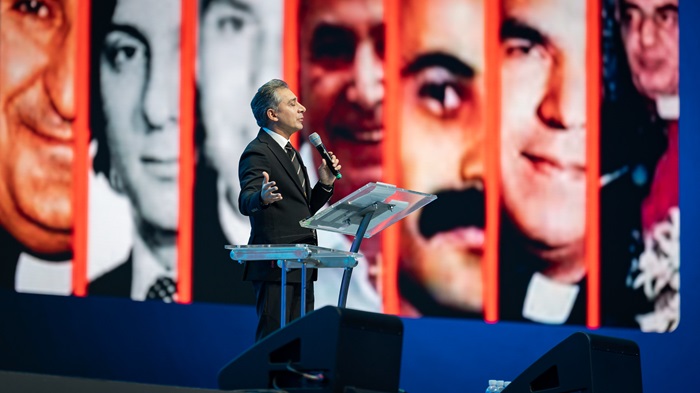
Farshid Fathi was imprisoned for five years in Iran: “Suffering and persecution are not the end of the story.”
- Great Commission: Efraim Tendero, former Secretary-General of World Evangelical Alliance, emphasized the urgency of fulfilling the Great Commission, reminding the global church that “God has called us to take the Gospel to the whole world, and we are lagging behind.”
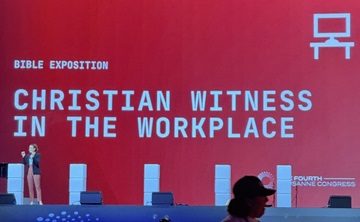 Reliance on the Holy Spirit. I understand that some Pentecostals and charismatics were unhappy with their lack of representation at Cape Town. David Wells, head of the Pentecostal Assemblies of Canada (and formerly a pastor in Metro Vancouver) told me that the first morning service showed Lausanne leaders have taken note.
Reliance on the Holy Spirit. I understand that some Pentecostals and charismatics were unhappy with their lack of representation at Cape Town. David Wells, head of the Pentecostal Assemblies of Canada (and formerly a pastor in Metro Vancouver) told me that the first morning service showed Lausanne leaders have taken note.- Workplace ministry: Julia Garschagen of the Pontes Institute for Science, Culture and Faith in Germany: “Your workplace is holy ground; you are a priestly presence in your workplace.”
Seoul Statement
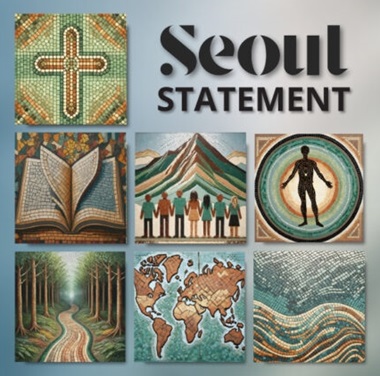 The first three congresses each released major documents: the Lausanne Covenant (1974), the Manila Manifesto (1989), and the Cape Town Commitment (2010).
The first three congresses each released major documents: the Lausanne Covenant (1974), the Manila Manifesto (1989), and the Cape Town Commitment (2010).
On the first day of this gathering, Lausanne announced the Seoul Statement, a seven-part treatise that states theological positions on the gospel, the Bible, the church, the ‘human person,’ discipleship, the ‘family of nations’ and technology.
Following is the Preamble to the Seoul Statement:
The Fourth Lausanne Congress held in Incheon, South Korea, marks the 50th anniversary of the birth of a remarkable movement committed to global mission. The First Lausanne Congress in 1974 brought together 2,700 church leaders from over 150 countries, who affirmed their shared conviction that the whole church must take the whole gospel to the whole world.
Following the First Congress, the global church did more to collaboratively accelerate worldwide evangelization than at any other period in history, resulting in unprecedented growth of the church, as millions in previously unreached regions embraced the gospel and experienced its transforming power.
We rejoice over what God has done through the church’s commitment to the great apostolic priority of proclaiming the good news of Jesus Christ in order to bring salvation to people lost in sin. Even so, the task of evangelization remains urgent as billions remain outside the reach of the message of God’s love and grace in Christ. Moreover, in the face of this expansive growth, the church in many parts of the world has struggled to effectively nurture the faith and discipleship of millions of first-generation Christians.
In the commission of the Lord Jesus to the apostles in Matthew 28:18-20, he made clear that the mandate given to the church – to “make disciples of all nations” – involved two equally important priorities: the evangelistic task of “baptising them into the name of the Father, the Son and the Holy Spirit,” and the pastoral task of “teaching them to obey all that [Christ] had commanded.”
Both these priorities are evident in the apostle Paul’s mission strategy in the book of Acts and in his many epistles. He was passionate about reaching the lost with the message of salvation, and he was equally passionate about strengthening the faith of believers so that they lived lives worthy of the gospel and were able to oppose false teachings that threatened to undermine the truth of the gospel. As he summarises: “We proclaim him; warning everyone and teaching everyone with all wisdom, that we may present everyone perfect in Christ” (Colossians 1:28).
We regret that during the last 50 years of evangelistic harvest, the global church has not adequately provided the teaching necessary to help new believers develop a truly biblical worldview. The church has often failed to nurture new believers to obey Christ’s call to radical discipleship at home, at school, in the church, in our neighbourhoods, and in the marketplace. It has also struggled to equip its leaders to respond to trending social values and to distortions of the gospel, which have threatened to erode the sincere faith of Christians and to destroy the unity and fellowship of the church of the Lord Jesus. Consequently, we are alarmed by the rise of false teachings and pseudo-Christian lifestyles, leading numerous believers away from the essential values of the gospel.
For 50 years, the Lausanne Movement has been guided by the Lausanne Covenant (1974), the Manila Manifesto (1989), and the Cape Town Commitment (2010). The Seoul Statement of the Fourth Lausanne Congress fully affirms those earlier Congress documents and builds on their firm foundation by renewing our commitment to the centrality of the gospel (Section I) and to the faithful reading of Scripture (Section II). Only in this way can we meet the specific challenges that now face the global church (Sections III-VII)as we seek to bear faithful witness to our crucified and risen Lord – from everywhere, to everywhere, for the sake of generations to come.
I will endeavour to follow up with at least a couple of articles about Lausanne 4 in the weeks to come.
All photos are provided by Lausanne.
- September 27 note: An email to participants from Mike du Toit, Director of Communications and Content, Lausanne Movement, said, in part:
The Seoul Statement was intended to be a gift to the global church by the Lausanne Theology Working Group with the purpose to ignite meaningful dialogue during our time together and beyond. We are deeply grateful for the broad engagement with the Statement this week during the Congress.
The Seoul Statement emerged from a multiyear process of listening to leaders from across the global church. It reflects the dedicated work of the Lausanne Theology Working Group and is intended to be read alongside the State of the Great Commission report. . . .
We recognize that in introducing the Seoul Statement, we should have been clearer in explaining its purpose and the way in which participants are invited to engage with it.

Flyn,
Thanks for this very inspiring and challenging report!
Dan Gowe